Capstone Demos: Part I
- 19 views
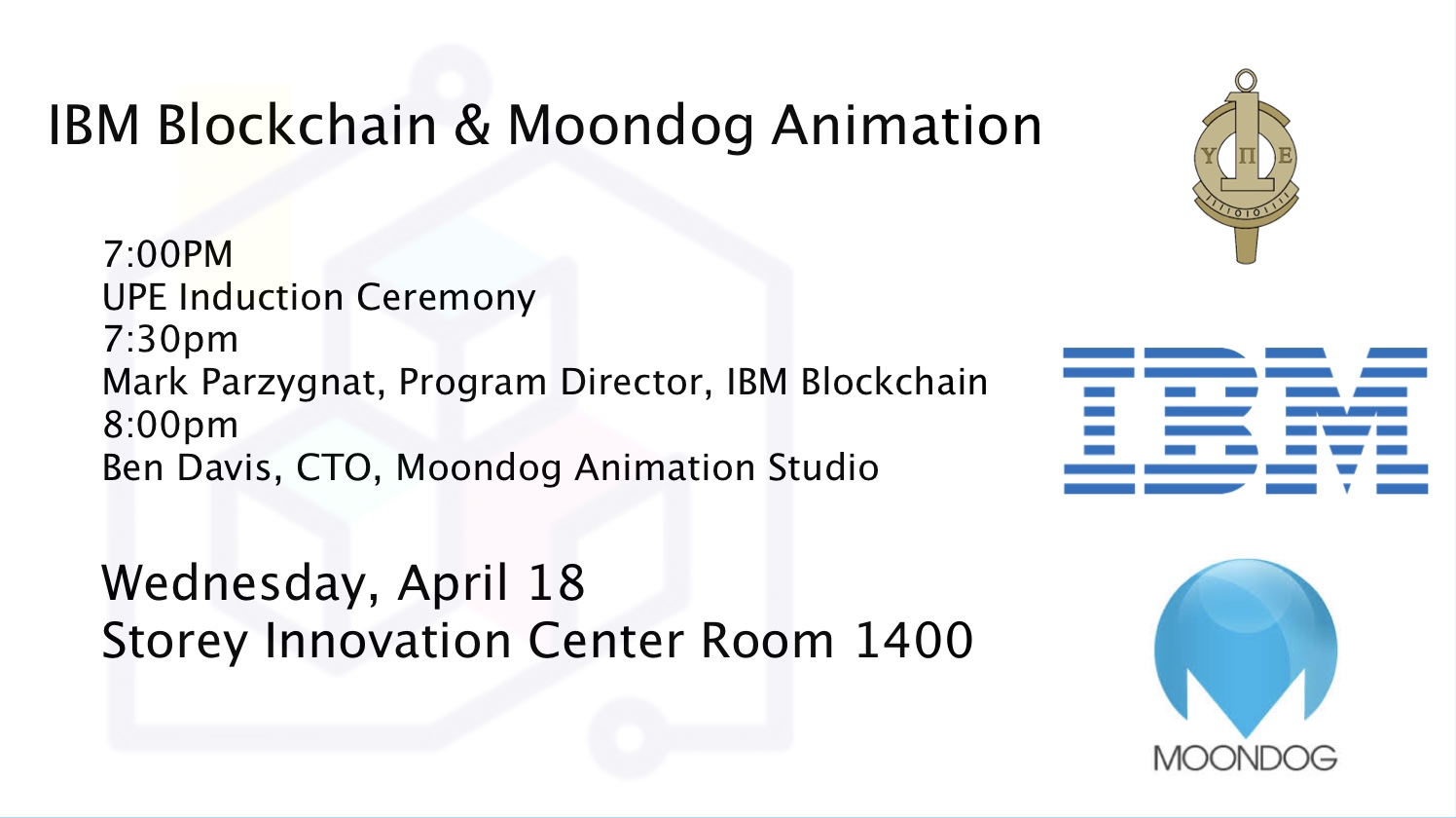 The Center for Advanced Analytics and Applied Innovation is hosting speakers Mark Parzyngat, Program Director at IBM Blockchain, and Ben Davis, Chief Technology Officer at Moondog Animation Studio. Tech talks will follow the induction ceremony of Upsilon Pi Epsilon, the Computing honor society.
Jim Stritzinger, Director of the Center for Advanced Analytics and Applied Innovation, is organizing this event.
The Center for Advanced Analytics and Applied Innovation is hosting speakers Mark Parzyngat, Program Director at IBM Blockchain, and Ben Davis, Chief Technology Officer at Moondog Animation Studio. Tech talks will follow the induction ceremony of Upsilon Pi Epsilon, the Computing honor society.
Jim Stritzinger, Director of the Center for Advanced Analytics and Applied Innovation, is organizing this event. Over the past few months, 18 mobile app ideas have been developed in conjunction with the computer science department. We are hosting a showcase competition for the 18 teams.
Why Attend?
Over the past few months, 18 mobile app ideas have been developed in conjunction with the computer science department. We are hosting a showcase competition for the 18 teams.
Why Attend?
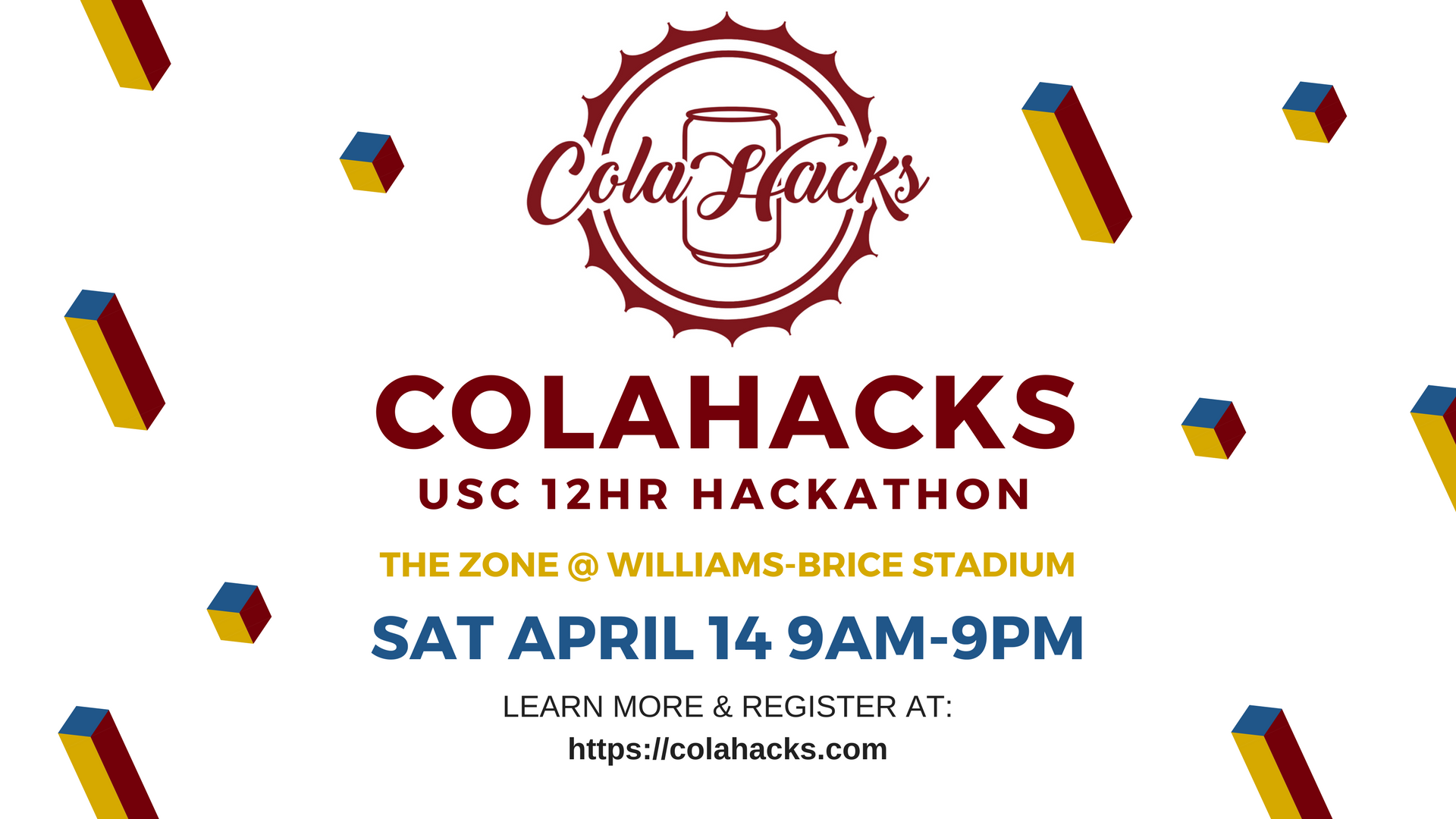 It is our pleasure to invite you to ColaHacks, USC's first student hackathon, taking place Saturday, April 14th from 9am-9pm at the Zone at Williams-Brice Stadium. Participation is limited to 160 students so if interested, please register as soon as possible at www.colahacks.com. Registration is free and open to all undergraduate/graduate students currently attending USC.
Major League Hacking (MLH) defines hackathon as an invention marathon. Anyone who has an interest in technology attends a hackathon to learn, build and share their creations over the course of a weekend in a relaxed and welcoming atmosphere. You don’t have to be a programmer, and you certainly don’t have to be a Computer Science major. All you need is a passion for solving unique challenges our generation faces and a love for technology.
ColaHacks gives students almost 12 hours to work on a project they feel betters Columbia, SC in some way; be it an app, website, or any other technology. Teams of students (1-4) will then demo and present their ideas to judges for the chance to compete for cash prizes as well as other gifts and awards.
There are many reasons you should want to attend a hackathon, but here are just a few benefits that ColaHacks will be offering:
It is our pleasure to invite you to ColaHacks, USC's first student hackathon, taking place Saturday, April 14th from 9am-9pm at the Zone at Williams-Brice Stadium. Participation is limited to 160 students so if interested, please register as soon as possible at www.colahacks.com. Registration is free and open to all undergraduate/graduate students currently attending USC.
Major League Hacking (MLH) defines hackathon as an invention marathon. Anyone who has an interest in technology attends a hackathon to learn, build and share their creations over the course of a weekend in a relaxed and welcoming atmosphere. You don’t have to be a programmer, and you certainly don’t have to be a Computer Science major. All you need is a passion for solving unique challenges our generation faces and a love for technology.
ColaHacks gives students almost 12 hours to work on a project they feel betters Columbia, SC in some way; be it an app, website, or any other technology. Teams of students (1-4) will then demo and present their ideas to judges for the chance to compete for cash prizes as well as other gifts and awards.
There are many reasons you should want to attend a hackathon, but here are just a few benefits that ColaHacks will be offering:
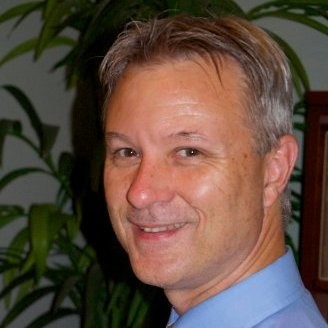 DISSERTATION DEFENSE
Author: Mark Daniels
Advisor: Dr. Csilla Farkas
Abstract
An individual’s healthcare data may be the most private information a person possesses. Current regulations, such as the Health Insurance Portability and Accountability Act of 1996 (HIPAA), safeguard patient data by assigning a sensitivity level to data items. However, this approach is limited when domain knowledge is used to infer additional patient data. In our research, we investigate privacy violations occurring when non-confidential patient data is combined with medical domain ontologies to disclose a patient’s protected health information (PHI).
We developed a framework that detects privacy violations and eliminates undesired inferences. Our inference channel removal process is based on controlling the release of the data items that lead to undesired inferences. These data items are either blocked from release or generalized to eliminate the disclosure of the PHI. We first developed an exhaustive framework to disrupt the undesired inferences, then improved on the methods using a heuristic-based approach. Our privacy model includes traditional security assessments (i.e., HIPAA) as well as considering safety and patient privacy preferences. We developed a graphic user interface that allows patients to control the release of their data. We also visualize the inferred data using the healthcare domain knowledge.
Date: April 11th, 2018
Time: 10:00 am
Place: Meeting room 2267, Innovation Center
DISSERTATION DEFENSE
Author: Mark Daniels
Advisor: Dr. Csilla Farkas
Abstract
An individual’s healthcare data may be the most private information a person possesses. Current regulations, such as the Health Insurance Portability and Accountability Act of 1996 (HIPAA), safeguard patient data by assigning a sensitivity level to data items. However, this approach is limited when domain knowledge is used to infer additional patient data. In our research, we investigate privacy violations occurring when non-confidential patient data is combined with medical domain ontologies to disclose a patient’s protected health information (PHI).
We developed a framework that detects privacy violations and eliminates undesired inferences. Our inference channel removal process is based on controlling the release of the data items that lead to undesired inferences. These data items are either blocked from release or generalized to eliminate the disclosure of the PHI. We first developed an exhaustive framework to disrupt the undesired inferences, then improved on the methods using a heuristic-based approach. Our privacy model includes traditional security assessments (i.e., HIPAA) as well as considering safety and patient privacy preferences. We developed a graphic user interface that allows patients to control the release of their data. We also visualize the inferred data using the healthcare domain knowledge.
Date: April 11th, 2018
Time: 10:00 am
Place: Meeting room 2267, Innovation Center DISSERTATION DEFENSE
Author : Xian Wu
Advisor : Dr. Jenay Beer
Abstract
Maintaining health and wellness while aging-in-place independently is crucial for older adults. Telepresence technology can be potentially beneficial for this target population to stay socially connected. However, this technology is not specifically designed for older adults. For this target population to adopt such technology successfully, it is important to ensure that they do not experience usability barriers. This research uses HCI/HRI concepts and technology design principles for older adults to design, develop and test telepresence user interfaces (UI). This addresses the following research questions: 1): What are the essential usability and privacy-enhanced features needed to inform the design and development of a new telepresence UI for aging population? 2): Is the new telepresence UI perceived as more usable and private by older users compared to traditional telepresence UI design?
Thirty older adults aged above 60 in South Carolina and Georgia participated in a within-subjects user-testing with two UIs: 1) a generic UI called Presence designed based on currently available telepresence robots; and 2) a privacy-enhanced usable telepresence UI named InTouch. Participants tested both UIs in a virtual home environment developed in Unity.
Results of this study suggest that older adults perceived InTouch to be more usable and private. This study provides insight on what usability and privacy features are critical for the aging population to use such telepresence technology. By investigating the design of telepresence robots for older users, and applying those findings to design recommendations, the final goal is to improve the ease of use and privacy level of telepresence robots – not only for our target users, but for all users who wish to enhance their social connectedness.
Date : April 3rd , 2018
Time : 10:00 am
Place : Meeting room 2265, Innovation Center
DISSERTATION DEFENSE
Author : Xian Wu
Advisor : Dr. Jenay Beer
Abstract
Maintaining health and wellness while aging-in-place independently is crucial for older adults. Telepresence technology can be potentially beneficial for this target population to stay socially connected. However, this technology is not specifically designed for older adults. For this target population to adopt such technology successfully, it is important to ensure that they do not experience usability barriers. This research uses HCI/HRI concepts and technology design principles for older adults to design, develop and test telepresence user interfaces (UI). This addresses the following research questions: 1): What are the essential usability and privacy-enhanced features needed to inform the design and development of a new telepresence UI for aging population? 2): Is the new telepresence UI perceived as more usable and private by older users compared to traditional telepresence UI design?
Thirty older adults aged above 60 in South Carolina and Georgia participated in a within-subjects user-testing with two UIs: 1) a generic UI called Presence designed based on currently available telepresence robots; and 2) a privacy-enhanced usable telepresence UI named InTouch. Participants tested both UIs in a virtual home environment developed in Unity.
Results of this study suggest that older adults perceived InTouch to be more usable and private. This study provides insight on what usability and privacy features are critical for the aging population to use such telepresence technology. By investigating the design of telepresence robots for older users, and applying those findings to design recommendations, the final goal is to improve the ease of use and privacy level of telepresence robots – not only for our target users, but for all users who wish to enhance their social connectedness.
Date : April 3rd , 2018
Time : 10:00 am
Place : Meeting room 2265, Innovation Center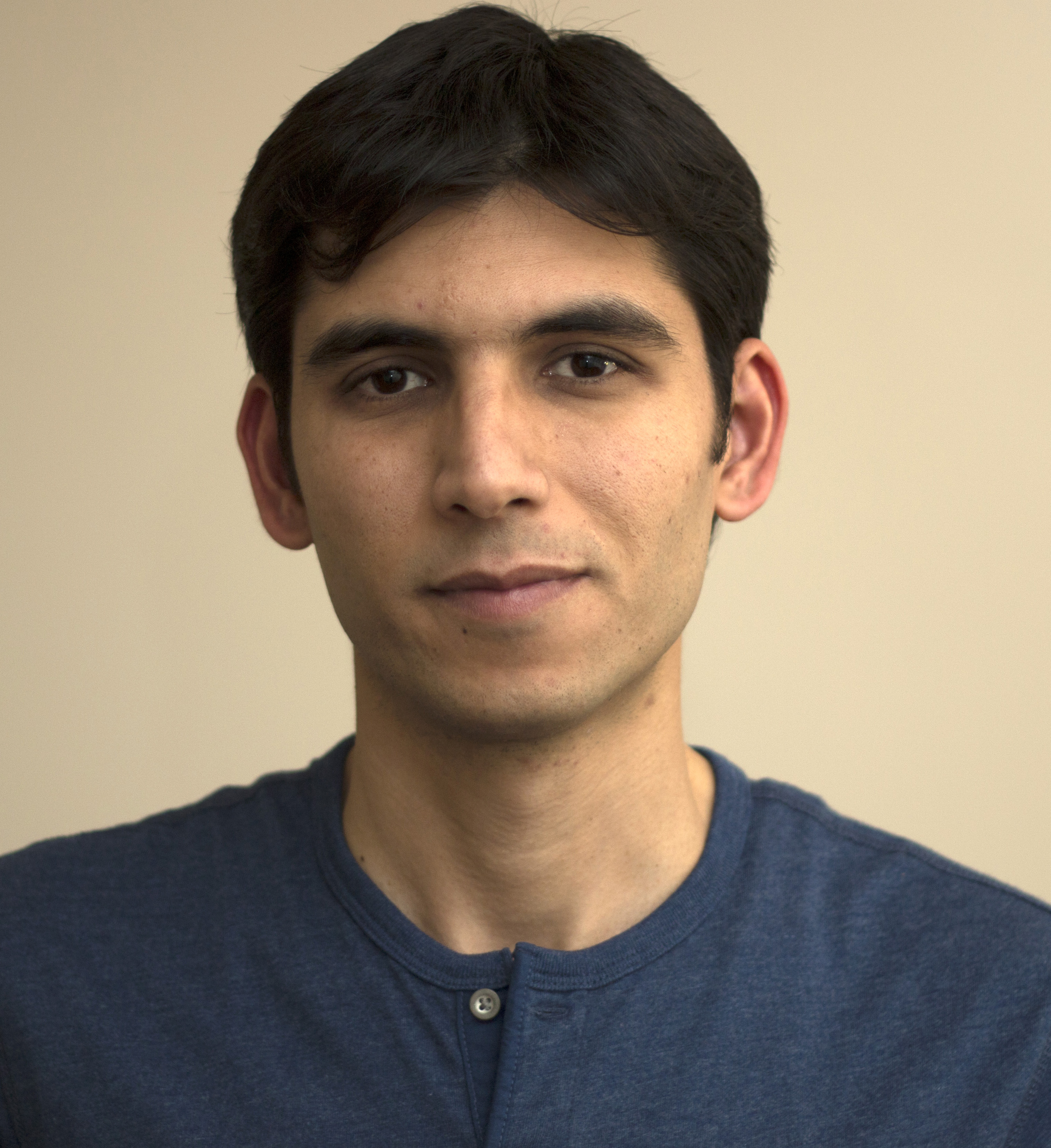 COLLOQUIUM
Rahmatollah Beheshti
Abstract
Most of the health conditions are directly or indirectly resulted from humans’ decisions. These decisions are affected by a wide range of personal and environmental factors. While understanding health decision- making processes can lead to significant breakthroughs in both treatment and prevention of different diseases, due to their complex nature, our knowledge about many of these processes is very limited. Computational and data-driven techniques are increasingly considered as powerful options to fuse various types of data (such as biological and behavioral data) to understand these complexities. In this talk, Dr. Beheshti will present several projects from the areas of smoking and obesity research in which he has used complex systems and AI methods to study health behaviors. Specifically, he will talk about one of his recent projects studying the role of price in food decision-making.
Dr. Rahmatollah Beheshti is a fourth-year postdoctoral fellow at the Johns Hopkins Bloomberg School of Public Health, with a joint appointment in the Department of Applied Math & Statistics at Johns Hopkins. He has a PhD in Computer Science and a Master in Artificial Intelligence and has been working in the area of Computational Epidemiology and Health Data Analytics for the past eight years. He has close to 20 first author full articles in these areas. Specifically, he has worked extensively on two major public health epidemics: smoking and obesity and has focused on very different aspects of these two, including the social, economic, environmental, and lately biological factors that affect those epidemics.
Date: Mar. 30 2018
Time: 10:15-11:15 am
Place: Innovation Center, Room 2277
COLLOQUIUM
Rahmatollah Beheshti
Abstract
Most of the health conditions are directly or indirectly resulted from humans’ decisions. These decisions are affected by a wide range of personal and environmental factors. While understanding health decision- making processes can lead to significant breakthroughs in both treatment and prevention of different diseases, due to their complex nature, our knowledge about many of these processes is very limited. Computational and data-driven techniques are increasingly considered as powerful options to fuse various types of data (such as biological and behavioral data) to understand these complexities. In this talk, Dr. Beheshti will present several projects from the areas of smoking and obesity research in which he has used complex systems and AI methods to study health behaviors. Specifically, he will talk about one of his recent projects studying the role of price in food decision-making.
Dr. Rahmatollah Beheshti is a fourth-year postdoctoral fellow at the Johns Hopkins Bloomberg School of Public Health, with a joint appointment in the Department of Applied Math & Statistics at Johns Hopkins. He has a PhD in Computer Science and a Master in Artificial Intelligence and has been working in the area of Computational Epidemiology and Health Data Analytics for the past eight years. He has close to 20 first author full articles in these areas. Specifically, he has worked extensively on two major public health epidemics: smoking and obesity and has focused on very different aspects of these two, including the social, economic, environmental, and lately biological factors that affect those epidemics.
Date: Mar. 30 2018
Time: 10:15-11:15 am
Place: Innovation Center, Room 2277 DISSERTATION DEFENSE
Author : Karina Liles
Advisor : Dr. Jenay Beer
Abstract
This research presents a new, socially adaptive robot tutor, Ms. An (Meeting Students’ Academic Needs). The goal of this research was to use a decision tree model to develop a socially adaptive robot tutor that predicted and responded to student emotion and performance to actively engage students in math education. The novelty of this multi-disciplinary project is the combination of the fields of HRI, AI, and education. In this study we 1) implemented a decision tree model to classify student emotion and performance for use in adaptive robot tutoring-an approach not applied to educational robotics; 2) presented an intuitive interface for seamless robot operation by novice users; and 3) applied direct human teaching methods (guided practice and progress monitoring) for a robot tutor to engage students in math education.
Twenty 4th and 5th grade students in rural South Carolina participated in a between subjects study with two conditions: A) with a non-adaptive robot (control group); and B) with a socially adaptive robot (adaptive group). Students engaged in two one-on-one tutoring sessions to practice multiplication per the South Carolina 4th and 5th grade math state standards.
Although our decision tree models were less optimal than we had hoped, the results gave answers to our current questions and clarity for future directions. Our adaptive strategies to engage students academically were effective. Further, all students enjoyed working with the robot and we did not see a difference in emotional engagement across the two groups. Our adaptive strategies made students think more deeply about their work and focus more.
This study offered insight for developing a socially adaptive robot tutor to engage students academically and emotionally while practicing multiplication. Results from this study will inform the human-robot interaction (HRI) and artificial intelligence (AI) communities on best practices and techniques within the scope of this work.
Date : March 27th, 2018
Time : 10:00 am
Place : Meeting room 2265, Innovation Center
DISSERTATION DEFENSE
Author : Karina Liles
Advisor : Dr. Jenay Beer
Abstract
This research presents a new, socially adaptive robot tutor, Ms. An (Meeting Students’ Academic Needs). The goal of this research was to use a decision tree model to develop a socially adaptive robot tutor that predicted and responded to student emotion and performance to actively engage students in math education. The novelty of this multi-disciplinary project is the combination of the fields of HRI, AI, and education. In this study we 1) implemented a decision tree model to classify student emotion and performance for use in adaptive robot tutoring-an approach not applied to educational robotics; 2) presented an intuitive interface for seamless robot operation by novice users; and 3) applied direct human teaching methods (guided practice and progress monitoring) for a robot tutor to engage students in math education.
Twenty 4th and 5th grade students in rural South Carolina participated in a between subjects study with two conditions: A) with a non-adaptive robot (control group); and B) with a socially adaptive robot (adaptive group). Students engaged in two one-on-one tutoring sessions to practice multiplication per the South Carolina 4th and 5th grade math state standards.
Although our decision tree models were less optimal than we had hoped, the results gave answers to our current questions and clarity for future directions. Our adaptive strategies to engage students academically were effective. Further, all students enjoyed working with the robot and we did not see a difference in emotional engagement across the two groups. Our adaptive strategies made students think more deeply about their work and focus more.
This study offered insight for developing a socially adaptive robot tutor to engage students academically and emotionally while practicing multiplication. Results from this study will inform the human-robot interaction (HRI) and artificial intelligence (AI) communities on best practices and techniques within the scope of this work.
Date : March 27th, 2018
Time : 10:00 am
Place : Meeting room 2265, Innovation Center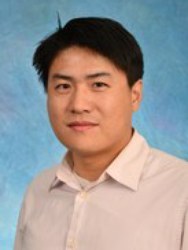 COLLOQUIUM
Guorong Wu
Abstract
Neuroimaging research has developed rapidly in last decade, with various applications of brain mapping technologies that provide mechanisms for discovering neuropsychiatric disorders in vivo. The human brain is something of an enigma. Much is known about its physical structure, but how it manages to marshal its myriad components into a powerhouse capable of performing so many different tasks remains a mystery. In this talk, I will demonstrate that it is more important to understand how the brain regions are connected rather than study each brain region individually. I will introduce my recent research on human brain connectome, with the focus on revealing high-order brain connectome and functional dynamics using learning-based approaches, and the successful applications in identifying neuro-disorder subjects such as Autism and Alzheimer’s disease.
Dr. Guorong Wu is an Assistant Professor in Department of Radiology at the University of North Carolina, Chapel Hill. His primary research interests are medical image analysis, big data mining, scientific data visualization, and computer-assisted diagnosis. He has been working on medical image analysis since he started my Ph.D. study in 2003. In 2007, he received the Ph.D. degree in computer science and engineering from Shanghai Jiao Tong University, Shanghai, China. He has developed many image processing methods for brain magnetic resonance imaging (MRI), diffusion tensor imaging, breast dynamic contrast-enhanced MRI (DCE-MRI), and computed tomography (CT) images. These cutting-edge computational methods have been successfully applied to the early diagnosis of Alzheimer’s disease, infant brain development study, and image-guided lung cancer radiotherapy. Meanwhile, Dr. Wu lead a multi- discipline research team in UNC which aims to translate the cutting-edge intelligent techniques to the imaging-based biomedical applications, for the sake of boosting translational medicine. Dr. Wu has released more than ten image analysis software packages to the medical imaging community, which count to totally more than 15,000 downloads since 2009.
Dr. Wu is the recipient of NIH Career Development Award (K01) and PI of NIH Exploratory/Developmental Research Grant Award (R21). He also serves as the Co-PI and Co-Investigator in other NSF and NIH grants.
Date: Mar. 26 2018
Time: 10:15-11:15 am
Place: Innovation Center, Room 2277
COLLOQUIUM
Guorong Wu
Abstract
Neuroimaging research has developed rapidly in last decade, with various applications of brain mapping technologies that provide mechanisms for discovering neuropsychiatric disorders in vivo. The human brain is something of an enigma. Much is known about its physical structure, but how it manages to marshal its myriad components into a powerhouse capable of performing so many different tasks remains a mystery. In this talk, I will demonstrate that it is more important to understand how the brain regions are connected rather than study each brain region individually. I will introduce my recent research on human brain connectome, with the focus on revealing high-order brain connectome and functional dynamics using learning-based approaches, and the successful applications in identifying neuro-disorder subjects such as Autism and Alzheimer’s disease.
Dr. Guorong Wu is an Assistant Professor in Department of Radiology at the University of North Carolina, Chapel Hill. His primary research interests are medical image analysis, big data mining, scientific data visualization, and computer-assisted diagnosis. He has been working on medical image analysis since he started my Ph.D. study in 2003. In 2007, he received the Ph.D. degree in computer science and engineering from Shanghai Jiao Tong University, Shanghai, China. He has developed many image processing methods for brain magnetic resonance imaging (MRI), diffusion tensor imaging, breast dynamic contrast-enhanced MRI (DCE-MRI), and computed tomography (CT) images. These cutting-edge computational methods have been successfully applied to the early diagnosis of Alzheimer’s disease, infant brain development study, and image-guided lung cancer radiotherapy. Meanwhile, Dr. Wu lead a multi- discipline research team in UNC which aims to translate the cutting-edge intelligent techniques to the imaging-based biomedical applications, for the sake of boosting translational medicine. Dr. Wu has released more than ten image analysis software packages to the medical imaging community, which count to totally more than 15,000 downloads since 2009.
Dr. Wu is the recipient of NIH Career Development Award (K01) and PI of NIH Exploratory/Developmental Research Grant Award (R21). He also serves as the Co-PI and Co-Investigator in other NSF and NIH grants.
Date: Mar. 26 2018
Time: 10:15-11:15 am
Place: Innovation Center, Room 2277